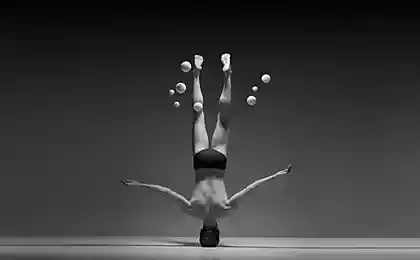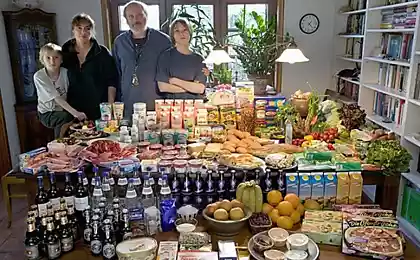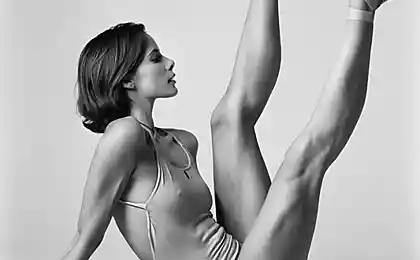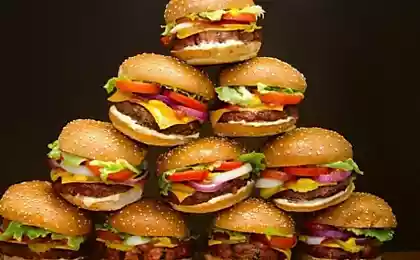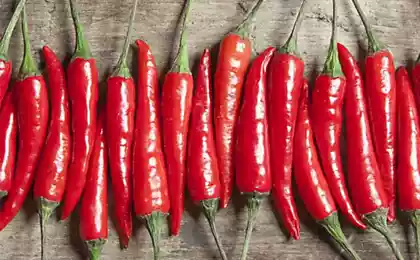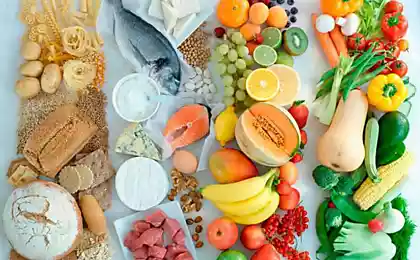713
"Exercise in not-thinking" Koike ryunosuke that will help you lose weight
One of the most impressed me over the past year books is the bestseller, "Exercise in not-thinking", napisannyi Buddhist priest Koike ryunosuke. The book immediately became a bestseller, first edition 2012, sold over 300 thousand copies, which for nonfiction in Japan very, very much. What is this book?

Koike ryunosuke examines various aspects of everyday modern life: food, reading, sleep, cleaning, anything, from blogging to building daily plans, and gives advice on how to improve these aspects of life using the methods of the followers of Buddhism.
That is, on the one hand, it is certainly religious literature, with a lot of difficult Buddhist terms and their explanation. And on the other hand, it's exactly a popular genre of non-fikshn dedicated to improving their daily lives with very specific tips.
As you might guess by the title, again the concept of Koike-San is not-thinking, getting rid of unnecessary negative thoughts, fears, pain and experiences. And not by the method of "don't think about white monkey"! Perhaps it is detailed, pragmatic advice me hooked in this book.
I must say that not all ideas agree, and not all recommendations are going to follow, but I would like to share ideas contained Koike ryunosuke. The scale of his thoughts in the article, of course, not transmit, so lay out the digest and excerpts of those chapters that seemed most interesting and useful.
So, the first part: how to lose weight by the method of a Buddhist monk?
In a world fascinated with weight loss, made mad money on advertising collections of exercise, personal trainers, newfangled diets. But our brain is a tricky and treacherous thing. As soon as he say "no" – activated the reverse reaction. Try not to think about how I want to eat – almost useless. So you should go on the reverse: don't force yourself to dismiss something and think about what you should think.

Why we get fat? The correct answer is: eat too much. Not going to eat a lot – won't fat.
Now the next question: why do we eat? In fact, the answer is also one. Because they eat not because they want to eat. We stuff a snack in between meals. We sit at the table because it's time, not because he's hungry. We obtain from food aesthetic pleasure, we communicate with friends and family at the table. We struggle with the stress of seizing it. And in the end all this pereedem.
He advises Koike-San?
1. To move away mentally from the topic of food. Not to think constantly about calories, excess weight, usefulness of products. Do not think about food in positive, in negative, whether it is the key.
2. Enjoy the taste of all that is. To feel the taste. When a person pays enough attention to gustatory sensations, he is able to determine for themselves the border rules.
Most interesting for me was a very specific recommendation on item number two. Will lead a large passage entirely.
"In our everyday "sense of taste", in fact, not a hundredth part of all the physical and gustatory experiences experienced by us. We eat, but at this time our brain is extraneous thoughts: "what was the name of this dish?.." "so, what I need to do after dinner..." "what a shitty day today was..." .
All these thoughts pushed the actual taste in the background. If, for example, to swallow the stew in one fell swoop, not even having time to realize what ingredients it consisted of, the brain just can't understand that the body already ate this stew. From this is born of anxiety, the brain gives the order: "Enough! Little! Put some more!" and if you continue this way of eating, the brain wean analyze incoming information.
If we stick to the principle "just in time to put in your mouth and swallow", if you constantly quick to score the stomach with food, not pleasure from the actual food, there is no necessary sense of satiety. Will overeating and consequently, obesity.
If we approach the issue from the other side, on the contrary, when a person chews food thoroughly, feeling the shades of its taste, he feels the amount of food necessary to satisfy hunger, receiving a signal about saturation from a smaller amount of food. Thus, from the feeling of saturation comes the knowledge of its nutritional standards. If the amount of food consumed is reduced, of course, in a natural way and decreases the weight.
Do you think it would to lose weight easily, without forcing yourself to endure and not taking on any extra responsibility?
And now I'd like to introduce you to one of their practices is a slow, thoughtful decision a small amount of food. I recommend you to practice it alone, after all, at the table with other people, we dedicate most of the time communication. So try at least once a week, on weekends, to prepare a healthy dish of brown rice and fresh vegetables, to devote more time and allow your stomach to relax.
Is, not thinking: Lesson 1. To pay attention to each movement
In order to put food in your mouth, you need to make a move. Don't miss each of these movements by the focus of your consciousness, pay attention to everything you do.
Reach out your hand and feel how tense the muscles of the hand. Take in hand Cutlery and feel the touch. That move you did to put the piece in his mouth, feel the movement. What physical sensations do you feel when a piece gets in your mouth? But what taste sensations are experiencing with language? At this point, you should not immediately start chewing. First put in place in hand with a Cutlery.
The rule is: put the food with chopsticks in the mouth – lower the hand with chopsticks on the table, and only then start eating. If chew at the same time with the lowering of the arms or continue to keep his hand in the air, the brain will be forced to disperse their attention on two different activities. In this state of scattered attention starts the flow of unnecessary thoughts, and focus on eating becomes very difficult.
Is, not thinking: Lesson 2. Stop at each movement of the tongue
If possible, pick up a piece of food in your mouth, close your eyes and remove visual noise from focus to focus fully on the taste sensations of the tongue and chewing.
After the beginning of chewing, the food is gradually disconnected in the mouth into smaller pieces. These diminishing pieces in contact with the language. Perhaps in everyday life you don't pay attention to the movement of the tongue, if you focus on it, it turns out that language is constantly moving.
The language goes back and forth in your mouth mixes with food, experiencing physical and taste sensations. In this process, signed a lot of information, but usually our brain is busy doing something else, worries and difficulties, and just throws out the "extra" information.
But through the information received by the language we receive and the knowledge that the food we eat, what they consist of, what nutrients they contain and how much you need this dish to meet the needs of the body. But usually our brain is occupied with their noise, ignores this vital information, you lose it.
But for now, focus on this information. The tongue moves, he's here now, concerned. Moving on, touched. A piece of food turned over in his mouth, fell under the teeth is chewed, it changes, it liquefies. Chewed piece changes its consistency, stanovista mushy. Changes the flavor, changing texture, changing again the taste, even the slush... Try closely, continuously monitor the sensations produced by the tongue.
The same applies to the ingestion of food: do not swallow it unconsciously, take on the process your attention, now swallow some, here, swallowed. A little late with my thoughts – not scary. If you do not notice swallowing – fix your attention at least on this, the fact that it is now swallowed something.
If you perceive information on each one, changing every second of every moment in my head just no room for extraneous, unnecessary thoughts".

As you a recommendation Koike ryunosuke? Not so easy to apply in real life, I know for myself, as a working wife and mother of a small child. But it was worth a try to follow the rules buddistskoj monk at least a little, at least for some time from Breakfast/lunch/dinner, a lot of things in my head really changed.
I realized how little time actually eating. In the morning in a hurry to get to work and child in garden in the evening – talk to your husband and listen to son, lunch is also always somewhere in a hurry. And what am I eating? What it actually taste like? Yet timid attempts of a conscious relationship to food has already lead to interesting results.
It saved his life — he cured cancer at stage 4! An incredible story of healingthe Clamping of the umbilical cord: a monument gynecological stupidity
I've realized that love in food that gives me great physical pleasure, and that only pretends to be such. Honestly, even when I choose products in the store, thinking in my head the process of chewing and feeling the taste of each of them tastes pretty much change. If the task is to change the usual schedule seems overwhelming, I strongly recommend to at least try this principle of power as he advises Koike ryunosuke, once a week, alone, for yourself. You can learn a lot about yourself! published
Source: nikkori.livejournal.com/138272.html

Koike ryunosuke examines various aspects of everyday modern life: food, reading, sleep, cleaning, anything, from blogging to building daily plans, and gives advice on how to improve these aspects of life using the methods of the followers of Buddhism.
That is, on the one hand, it is certainly religious literature, with a lot of difficult Buddhist terms and their explanation. And on the other hand, it's exactly a popular genre of non-fikshn dedicated to improving their daily lives with very specific tips.
As you might guess by the title, again the concept of Koike-San is not-thinking, getting rid of unnecessary negative thoughts, fears, pain and experiences. And not by the method of "don't think about white monkey"! Perhaps it is detailed, pragmatic advice me hooked in this book.
I must say that not all ideas agree, and not all recommendations are going to follow, but I would like to share ideas contained Koike ryunosuke. The scale of his thoughts in the article, of course, not transmit, so lay out the digest and excerpts of those chapters that seemed most interesting and useful.
So, the first part: how to lose weight by the method of a Buddhist monk?
In a world fascinated with weight loss, made mad money on advertising collections of exercise, personal trainers, newfangled diets. But our brain is a tricky and treacherous thing. As soon as he say "no" – activated the reverse reaction. Try not to think about how I want to eat – almost useless. So you should go on the reverse: don't force yourself to dismiss something and think about what you should think.

Why we get fat? The correct answer is: eat too much. Not going to eat a lot – won't fat.
Now the next question: why do we eat? In fact, the answer is also one. Because they eat not because they want to eat. We stuff a snack in between meals. We sit at the table because it's time, not because he's hungry. We obtain from food aesthetic pleasure, we communicate with friends and family at the table. We struggle with the stress of seizing it. And in the end all this pereedem.
He advises Koike-San?
1. To move away mentally from the topic of food. Not to think constantly about calories, excess weight, usefulness of products. Do not think about food in positive, in negative, whether it is the key.
2. Enjoy the taste of all that is. To feel the taste. When a person pays enough attention to gustatory sensations, he is able to determine for themselves the border rules.
Most interesting for me was a very specific recommendation on item number two. Will lead a large passage entirely.
"In our everyday "sense of taste", in fact, not a hundredth part of all the physical and gustatory experiences experienced by us. We eat, but at this time our brain is extraneous thoughts: "what was the name of this dish?.." "so, what I need to do after dinner..." "what a shitty day today was..." .
All these thoughts pushed the actual taste in the background. If, for example, to swallow the stew in one fell swoop, not even having time to realize what ingredients it consisted of, the brain just can't understand that the body already ate this stew. From this is born of anxiety, the brain gives the order: "Enough! Little! Put some more!" and if you continue this way of eating, the brain wean analyze incoming information.
If we stick to the principle "just in time to put in your mouth and swallow", if you constantly quick to score the stomach with food, not pleasure from the actual food, there is no necessary sense of satiety. Will overeating and consequently, obesity.
If we approach the issue from the other side, on the contrary, when a person chews food thoroughly, feeling the shades of its taste, he feels the amount of food necessary to satisfy hunger, receiving a signal about saturation from a smaller amount of food. Thus, from the feeling of saturation comes the knowledge of its nutritional standards. If the amount of food consumed is reduced, of course, in a natural way and decreases the weight.
Do you think it would to lose weight easily, without forcing yourself to endure and not taking on any extra responsibility?
And now I'd like to introduce you to one of their practices is a slow, thoughtful decision a small amount of food. I recommend you to practice it alone, after all, at the table with other people, we dedicate most of the time communication. So try at least once a week, on weekends, to prepare a healthy dish of brown rice and fresh vegetables, to devote more time and allow your stomach to relax.
Is, not thinking: Lesson 1. To pay attention to each movement
In order to put food in your mouth, you need to make a move. Don't miss each of these movements by the focus of your consciousness, pay attention to everything you do.
Reach out your hand and feel how tense the muscles of the hand. Take in hand Cutlery and feel the touch. That move you did to put the piece in his mouth, feel the movement. What physical sensations do you feel when a piece gets in your mouth? But what taste sensations are experiencing with language? At this point, you should not immediately start chewing. First put in place in hand with a Cutlery.
The rule is: put the food with chopsticks in the mouth – lower the hand with chopsticks on the table, and only then start eating. If chew at the same time with the lowering of the arms or continue to keep his hand in the air, the brain will be forced to disperse their attention on two different activities. In this state of scattered attention starts the flow of unnecessary thoughts, and focus on eating becomes very difficult.
Is, not thinking: Lesson 2. Stop at each movement of the tongue
If possible, pick up a piece of food in your mouth, close your eyes and remove visual noise from focus to focus fully on the taste sensations of the tongue and chewing.
After the beginning of chewing, the food is gradually disconnected in the mouth into smaller pieces. These diminishing pieces in contact with the language. Perhaps in everyday life you don't pay attention to the movement of the tongue, if you focus on it, it turns out that language is constantly moving.
The language goes back and forth in your mouth mixes with food, experiencing physical and taste sensations. In this process, signed a lot of information, but usually our brain is busy doing something else, worries and difficulties, and just throws out the "extra" information.
But through the information received by the language we receive and the knowledge that the food we eat, what they consist of, what nutrients they contain and how much you need this dish to meet the needs of the body. But usually our brain is occupied with their noise, ignores this vital information, you lose it.
But for now, focus on this information. The tongue moves, he's here now, concerned. Moving on, touched. A piece of food turned over in his mouth, fell under the teeth is chewed, it changes, it liquefies. Chewed piece changes its consistency, stanovista mushy. Changes the flavor, changing texture, changing again the taste, even the slush... Try closely, continuously monitor the sensations produced by the tongue.
The same applies to the ingestion of food: do not swallow it unconsciously, take on the process your attention, now swallow some, here, swallowed. A little late with my thoughts – not scary. If you do not notice swallowing – fix your attention at least on this, the fact that it is now swallowed something.
If you perceive information on each one, changing every second of every moment in my head just no room for extraneous, unnecessary thoughts".

As you a recommendation Koike ryunosuke? Not so easy to apply in real life, I know for myself, as a working wife and mother of a small child. But it was worth a try to follow the rules buddistskoj monk at least a little, at least for some time from Breakfast/lunch/dinner, a lot of things in my head really changed.
I realized how little time actually eating. In the morning in a hurry to get to work and child in garden in the evening – talk to your husband and listen to son, lunch is also always somewhere in a hurry. And what am I eating? What it actually taste like? Yet timid attempts of a conscious relationship to food has already lead to interesting results.
It saved his life — he cured cancer at stage 4! An incredible story of healingthe Clamping of the umbilical cord: a monument gynecological stupidity
I've realized that love in food that gives me great physical pleasure, and that only pretends to be such. Honestly, even when I choose products in the store, thinking in my head the process of chewing and feeling the taste of each of them tastes pretty much change. If the task is to change the usual schedule seems overwhelming, I strongly recommend to at least try this principle of power as he advises Koike ryunosuke, once a week, alone, for yourself. You can learn a lot about yourself! published
Source: nikkori.livejournal.com/138272.html
How to cook pumpkin cream soup: 5 best recipes
You is the average of the 5 people with whom you spend most of your time!


